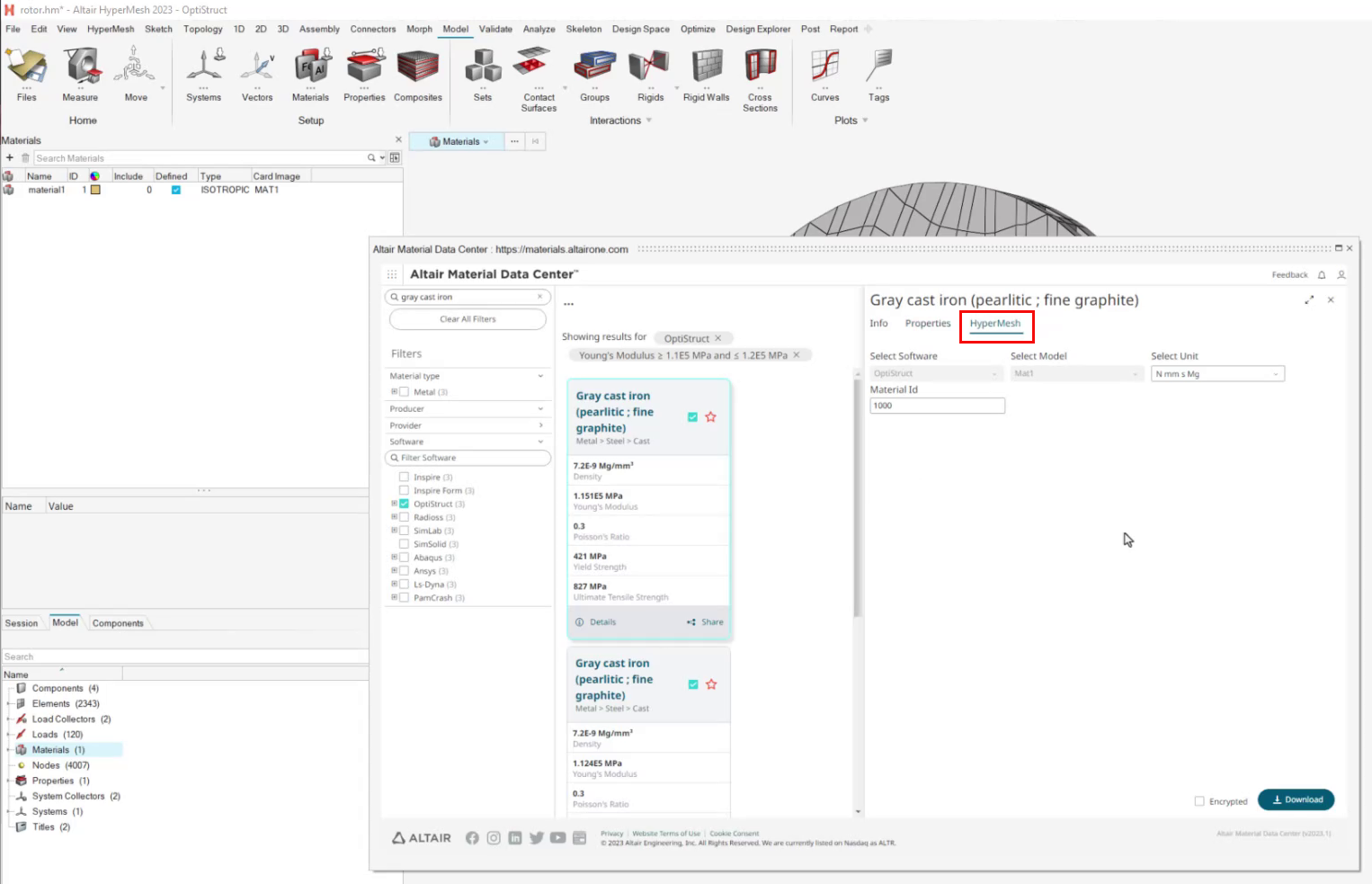Integrated Desktop Applications
Get instant access to an exhaustive database with thousands of simulation ready materials directly from within Altair desktop applications! This seamless integration automatically lists materials suitable for the application and lets users look up, search, compare and download CAE-ready material cards directly in the software.
Prerequisites
- Have AMDC Explorer and Explorer Plus access to download materials.
- Download the latest desktop application from Altair Marketplace. The Download tab of the desktop application on Altair Marketplace provides OS, version-based executable files. Follow the installation instructions and reference documents provided to install the desktop application.
- License the desktop application.
AMDC is integrated with the following Desktop Applications
-
Altair Material Modeler (AMM): is specialized CAE software powered by COMPOSE technology. Using raw test data, it rapidly and accurately generates simulation-ready material cards for nonlinear bulk materials like metals and plastics.
This reduces time and costs for material experts. The user-friendly interface simplifies the creation of material cards for implicit and explicit simulations. These cards are compatible with commercial solvers, and ideal for validation simulations and final engineering use.
- Altair HyperMesh: is a powerful simulation solution that redefines CAE design processes across industries with unmatched pre and post-processing capabilities for finite element modeling. It allows engineers to analyze design conditions in a highly interactive and visual environment. Advanced automation tools within HyperMesh allow users to optimize meshes from a set of quality criteria, change existing meshes through morphing, and generate mid-surfaces from models of varying thickness.
- Altair Inspire: is a concept design tool for structural optimization, finite element analysis, motion analysis, and additive manufacturing. It uses topology, topography, gauge, and PolyNURBS optimization to produce polymesh shapes that can be exported to other design tools and .stl files for rapid prototyping. The resulting shapes are well-adapted to their intended structural function, efficient in material use, and conducive to various manufacturing processes.
- Altair Inspire Mold: is a modern simulation-driven design environment that lets you test, validate, correct, and optimize the design of injection-molded components. The software leverages to determine ideal part designs, material usage, and manufacturing processes long before any physical injection molding begins.
- Altair Inspire Extrude offers a simulation tool for analyzing and validating extrusion die designs, helping companies produce complex profiles more efficiently. The operations such as meshing or boundary condition creation are completely done in the background with no user intervention.
-
Altair SimLab: is a process-oriented multidisciplinary simulation environment to accurately analyze the performance of complex assemblies. Multiple physics including structural, thermal, and fluid dynamics can be easily set up using highly automated modeling tasks, helping to reduce the time spent creating finite element models and interpreting results. Altair’s robust, accurate, and scalable solvers can run either locally, on remote servers, or in the cloud.
- Altair Feko: is a comprehensive computational electromagnetics (CEM) software product used widely in the telecommunications, automotive, aerospace, and defense industries. Feko offers several frequency domain electromagnetic (EM) solution methods as well as a time domain method under a single license.
- Launch the desktop application.
- In Altair HyperMesh, open Material browser.
- On the right click menu, select Library > Load from AMDC.
- Login to AMDC with your Altair One credentials.
- Search and filter the specific material list.
- Select the required material from your search result.
- Click Details. In the information tile of the
material. Note: By default, the Info tab displays the general information of the selected material.
- Click HyperMesh, the integrated desktop application
tab to export the material data as a CAE-ready Simulation file.
The integrated desktop application, the HyperMesh tab is displaying in the following example:

Figure 1. Access Materials using AMDC Plug-in in Altair HyperMesh - Click Download. The CAE material card is downloaded
in the integrated desktop application.
The HyperMesh Plug-in allows you to download:
- numerous materials at once
- simulation-ready CAE cards from your own private database
- Click Download. The CAE material card is downloaded in the integrated desktop application.
The desktop integrations communicate with AMDC using a fixed port. By default, this port is 7776. Set the default port number in your system environmental variable and then restart the desktop application.